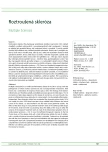Familial aggregation of Parkinson’s disease: a genealogical study
Authors:
K. Kollárová 1; P. Kaňovský 1; A. Šantavá 2; R. Obereignerů 1; I. Nestrašil 1; P. Ressner 1
Authors‘ workplace:
Neurologická klinika LF UP a FN Olomouc
1; Ústav lékařské genetiky a fetální medicíny LF UP a FN Olomouc
2
Published in:
Cesk Slov Neurol N 2008; 71/104(2): 197-200
Category:
Short Communication
Overview
Parkinson's disease (PD) is the second most common neurodegenerative disease after Alzheimer's disease. It is characterised by a high variability for the age of the onset of symptoms. The question is whether the genes predisposing to the development of PD are also responsible for the symptom onset age [1]. The onset of PD symptoms at a younger age is related to familial incidence of the disease, as the age of onset in some families with PD was lower than 50 years. In some Parkinsonism families, the onset of symptoms was reported below 50 years of age. Based on this observation, the onset of PD symptoms at a younger age is supposed to be related to familial incidence of Parkinson disease. The familial forms stand for between 10 and 15 % of all cases [2]. There are few prospective studies concerning rare incidence of large Parkinsonism families, low hereditability and large heterogeneity of PD, which endorse this hypothesis. The objective of this study is to compare the link between the early onset and familial incidence of PD, i.e. to find out whether or not genetic factors contribute to early onset of PD. 148 patients regularly monitored by the supraregional Centre for Diagnosis and Treatment of Neurodegenerative Diseases filled in a structured questionnaire. Questions concerned the sex and age, the first symptoms of the disease and the age of their onset in the monitored patients, as well as in their relatives. 100 filled questionnaires were returned for evaluation. Familiar incidence associated with low age of PD onset was confirmed in 18 cases (9 men and 9 women) out of 100 patients enrolled in the epidemiological study. Paternal heredity was discovered in 4 cases in men, and maternal heredity was discovered in 7 cases in women.
Key words:
Parkinson’s disease – familiar incidence – type of heredity – age of onset
Sources
1. Eriksen JL, Wszolek Z, Petrucelli L. Molecular pathogenesis of Parkinson disease. Arch Neurol 2005; 62 : 353–357.
2. Nussbaum RL, Polymeropoulos MH. Genetics of Parkinson's disease. Hum Mol Genet 1997; 6 : 1687–1691.
3. Leroux PD. Contribution à l'étude des causes de la paralysie agitante. Paris: 1880.
4. Polymerupoulos MH, Lavedan C, Leroy E, Ide SE, Dehejia, Dutra A et al. Mutation in the alpha-synuclein gene identified in families with Parkinson's disease. Science 1997; 276 : 2045–2047.
5. Gosal D, Ross OA, Toft M. Parkinson's disease: the genetics of a heterogeneous disorder. Eur J Neurol 2006; 13 : 616–627.
6. Kis B, Schrag A, Ben-Shlomo Y, Klein C, Gasperi A, Spoegler F et al. Novel three-stage ascertainment method: prevalence of PD and parkinsonism in South Tyrol. Neurology 2002; 58 : 1820–1825.
7. Wooten GF, Currie LJ, Bennett JP, Harrison MB, Trugman JM Parker WD jr. Maternal inheritance in Parkinson's disease. Ann Neurol 1997; 41 : 265–268.
8. Pankratz N, Nichols WC, Uniacke SK, Halter C, Rudolph A, Shults C et al. Significant linkage of Parkinson's disease to chromosome 2q36-37. Am J Hum Genet 2003; 72 : 1053–1057.
9. Hughes AJ, Daniel SE, Kilford L, Lees AJ. Accuracy of clinical diagnosis of idiopathic Parkinson's disease. A clinical pathological study of 100 cases. J Neurol Neurosurg Psychiatry 1993; 56 : 938–939.
10. Veselá O, Růžička E, Jech R et al. Esenciální tremor v naší populaci nemocných – základní charakteristika onemocnění a vyšetření kresbou spirály. Cesk Slov Neurol N 2002; 65/98 : 180–186.
11. Pankratz N, Foroud T. Genetics of Parkinson's disease. NeuroRx. 2004; 1 : 235–242.
12. Muñoz E, Pastor P, José Martí M, Vallderiola F, Oliva R, Tolosa E. Sporadic and familial Parkinson's disease. Med Clin (Barc) 2001; 116 : 601–604.
13. Hague SM, Klaffke S, Bandmann O. Neurodegenerative disorders: Parkinson's and Huntington's disease. J Neurol Neurosurg Psychiatry 2005; 76 : 1058–1063.
Labels
Paediatric neurology Neurosurgery NeurologyArticle was published in
Czech and Slovak Neurology and Neurosurgery

2008 Issue 2
-
All articles in this issue
- Multiple sclerosis
- Failure of pharmacological antiepileptic treatment
- Pathophysiology of conduction block in neuromuscular diseases
- Woman and ictus
- Diagnosis of hyponatraemia in neurointensive care: the role of renal function parameters
- The Pitfalls of Diagnosis and Treatment of Flexion Distraction Injuries of the Thoracic and Lumbar Spine: a Prospective Study
- Effect of endoscopic and classic surgery for carpal tunnel syndrom
- Mild controlled hypothermia – a neuroprotective method for late ischaemic complications in resuscitation care for patients with severe spontaneous subarachnoid hemorrhage caused by aneurism rupture
- Intracranial angioplasty and stent implantation in atherosclerotic lesions
- Familial aggregation of Parkinson’s disease: a genealogical study
- PCR Detection of Herpes Viruses in Patients with Acute „Idiopathic“ Facial Paresis
- Treatment Results of Low-Grade Gliomas in Children (a Retrospective Data Analysis)
- Hemangioblastoma and its treatment using Leksell Gamma Knife
- Smith-Magenis syndrome: a case report
- Czech and Slovak Neurology and Neurosurgery
- Journal archive
- Current issue
- About the journal
Most read in this issue
- Multiple sclerosis
- Hemangioblastoma and its treatment using Leksell Gamma Knife
- Smith-Magenis syndrome: a case report
- Treatment Results of Low-Grade Gliomas in Children (a Retrospective Data Analysis)
